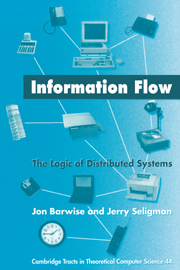Book contents
- Frontmatter
- Contents
- Preface
- Part I Introduction
- Part II Channel Theory
- 4 Classifications and Infomorphisms
- 5 Operations on Classifications
- 6 Distributed Systems
- 7 Boolean Operations and Classifications
- 8 State Spaces
- 9 Regular Theories
- 10 Operations on Theories
- 11 Boolean Operations and Theories
- 12 Local Logics
- 13 Reasoning at a Distance
- 14 Representing Local Logics
- 15 Distributed Logics
- 16 Logics and State Spaces
- Part III Explorations
- Answers to Selected Exercises
- Bibliography
- Glossary of Notation
- Index of Definitions
- Index of Names
15 - Distributed Logics
Published online by Cambridge University Press: 05 November 2011
- Frontmatter
- Contents
- Preface
- Part I Introduction
- Part II Channel Theory
- 4 Classifications and Infomorphisms
- 5 Operations on Classifications
- 6 Distributed Systems
- 7 Boolean Operations and Classifications
- 8 State Spaces
- 9 Regular Theories
- 10 Operations on Theories
- 11 Boolean Operations and Theories
- 12 Local Logics
- 13 Reasoning at a Distance
- 14 Representing Local Logics
- 15 Distributed Logics
- 16 Logics and State Spaces
- Part III Explorations
- Answers to Selected Exercises
- Bibliography
- Glossary of Notation
- Index of Definitions
- Index of Names
Summary
The view of information put forward here associates information flow with distributed systems. Such a system A, we recall, consists of an indexed family cla(A) = {Ai}i∈I of classifications together with a set inf (A) of isomorphisms, all of which have both a domain and a codomain in cla(A). With any such a system we want to associate a systemwide logic Log(A) on the sum ∑i∈I,Ai of the classifications in the system. The constraints of Log(A) should use the lawlike regularities represented by the system as a whole. The normal tokens of Log(A) model those indexed families of tokens to which the constraints are guaranteed to apply, by virtue of the structure of the system.
If we consider a given component classification Ai of A, there are at least two sensible logics on Ai that we might want to incorporate into Log(A), the a priori logic AP(Ai) and the natural logic Log(Ai). The former assumes we are given no information about the constraints of Ai except for the trivial constraints. The latter assumes perfect information about the constraints of Ai. There is typically quite a difference. But really these are just two extremes in our ordering of sound local logics on Ai. After all, in dealing with a distributed system, we may have not just the component classifications and their informorphisms, but also local logics on the component classifications. We want the systemwide logic to incorporate these local logics.
- Type
- Chapter
- Information
- Information FlowThe Logic of Distributed Systems, pp. 182 - 194Publisher: Cambridge University PressPrint publication year: 1997



